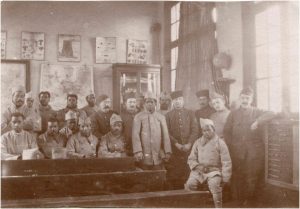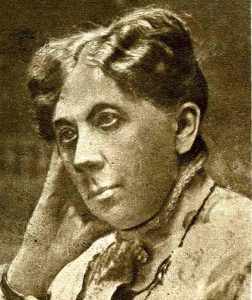Women acting as pastors
Like all French citizens pastors could not avoid general mobilization. They had to leave their parishes and no longer performed religious services for their communities. That is why some delegated tasks to their spouses. On 3 December, 1914, the National Union of French Evangelical Reformed Churches sent a letter to all pastors’ wives, asking them to perform their husbands’ duties. Thus, the mobilization of pastors’ wives in war times resulted from the will not only of individuals but of religious authorities too.
In the absence of the pastors, their wives were also responsible for ‘visiting members of the community, caring for the sick, managing Sunday school, maintaining places of worship and seeing that the registers were properly kept […] and promoting order, unity and life’ within the Protestant community. But traditionally, pastors already assigned such tasks to their wives.
Some of them, however, assumed individual initiatives to maintain a well-functioning parish. They bravely ministered worshiping, performing baptisms or weddings or funerals, or even collecting contributions. Their freedom of action was still limited because some religious duties could be performed by men only, such as celebrating Holy Communion.
The role of pastors’ wives during the war was significant, even more so as it was not restricted to fulfilling the duties of their mobilized spouses. In late 1916 Marguerite de Witt-Schlumberger, a housewife, even admitted ‘The burden is sometimes heavy because we have to meet every need of the family and of the Church, inside and outside…’, in reply to an extensive enquiry by Protestant newspapers.
Marguerite de Witt-Schlumberger, a Protestant activist
Beside pastors’ wives, other Protestant women played an outstanding part during the war, namely Marguerite de Witt-Schlumberger (1853-1924), who acted on the political scene and spoke out.
She was a young Protestant woman who left her home region Normandy in 1876 to join her husband in Alsace, then a German province. She raised six children who successively left Alsace before the war. Later on, she and her husband went back to Normandy where she started several militant activities when the war broke out.
Firstly, she founded an association to help refugees and evacuees from Alsace-Lorraine. Being married to an Alsatian she was shocked by the fact that Belgians and the inhabitants of Northern regions were granted refugees status in allied countries, whereas Alsatian-Lorraines were not because their province was under German rule…Marguerite protested and advocated their fate and finally won their case.
Secondly, and most significantly she opened shelters for soldiers on leave: ‘friendly places without alcohol and within a neutral confessional and political atmosphere.’ The aim was notably to fight the devastating effects of alcoholism among soldiers. She decided to take one more step in appealing for the State’s attention on the problem. She expanded her efforts until the end of the war.
In short, the role of Protestant women during the war did not directly affect the status of women in the French society. Though women had experienced a kind of freedom while their husbands were away, at the end of the war they resumed their former role returning to a statu quo ante. Some women however did not wish to go back after their wartime independence. They confronted their husbands and made radical decisions, namely to divorce them. The contribution of women to the war effort between 1914 and 1918 was not rewarded in proportion to their investments. They would have to wait until the end of WWII to have their rights take ‘a significant quantum leap forward’, they were granted the right to vote in 1944, after it was repeatedly refused by the Senate in the 1920s and 1930s.



